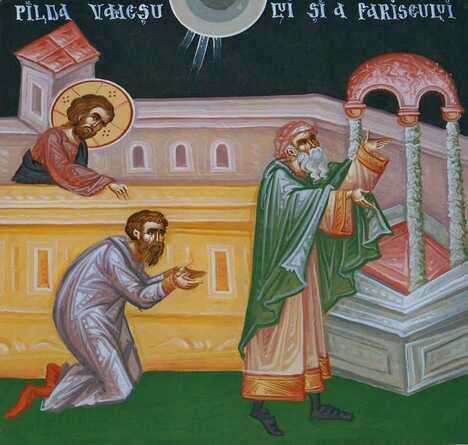Please remember that tonight we are reading through the parable of the Laborers in the Vineyard found in Matthew 19:30-20:16 and the parable of the Tax Collector and the Pharisee found in Luke 18:9-14. Within these emails and the attachments, I try to put forward different ways of reading the parables with which most of us may already be somewhat familiar. The attached commentaries raise different ways of not only looking at these parables but also within the broader Christian thought. Of course, you’re always welcome to disagree with my thoughts in these emails or the thoughts of the commentaries.
In the parable of the Laborers in the Vineyard, ++Dmitri points out that we see Christ’s unfailing and universal love for us. In the parable, the master (Christ) goes forth and calls laborers to work in his vineyard, and he goes back and calls again, and he goes back and calls again, and he goes back and calls again. As Archbishop Dmitri points out, “God desires all people to be saved and to come to the knowledge of the truth.” 1 Tim. 2:4. Therefore, we should work and hope for the salvation of all people. To fail to do so, and to take satisfaction in the loss of anyone, is to be like the resentful first laborers. This doesn’t necessarily mean that there is universal salvation, but that, from his perspective, divine love holds open that possibility.
In the parable of the Tax Collector and the Pharisee, Bailey brings out that the underlying difference between the two men may lie in their respective understanding of the nature of sin. As Bailey writes, “Sin for Jesus is not primarily a broken law but a broken relationship.” The Pharisee sees sin as the failure to obey the rules laid down in Scripture. Therefore, he is righteous in his own mind because he not only tithes what the Scriptures require but he tithes of everything he owns. The tax collector, however, simply prays for the restoration of the relationship between God and himself. Although the standard English translation of the Publican’s prayer is “God have mercy on me a sinner,” Bailey says a more accurate would be “O God, make an atonement for me.” In other words, the tax collector prays that “God, make me at-one-ment with you.” Sin isn’t the breach of rule but the breach of the relationship, although the two may be intertwined. So, for example, in Ezekiel 16, God doesn’t condemn Israel’s idolatry because it violates the legal prohibition of the first commandment, but because it violates the sacred relationship between God and his people.
Dinner tonight is at 6. Discussion will start around 6:45. The menu is meatloaf. Please bring a friend.
O Lord, Thou hast condemned the Pharisee who justified himself by boasting of his works, and Thou hast justified the Publican who humbled himself and with cries of sorrow begged for mercy. For Thou dost reject proud minded thoughts, but Thou dost not despise a contrite heart. Therefore in abasement we fall down before Thee who hast suffered for our sake: grant us forgiveness and great mercy Let us flee the proud speaking of the Pharisee and learn the humility of the Publican, and with groaning let us cry unto the Savior:Be merciful to us, for Thou alone art ready to forgive.
The “Collect” for the Sunday of the Publican and Pharisee in the Orthodox Church

